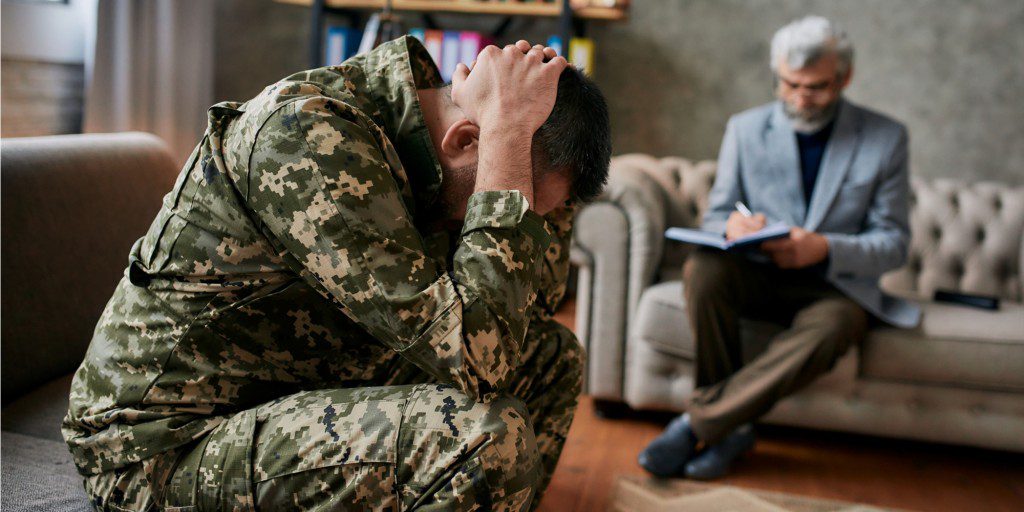Alcohol is the most commonly abused substance in the veteran population. Veterans may abuse alcohol because they are suffering from mental illness or having difficulties adjusting to civilian life. Given that so many servicemembers abuse alcohol, many are likely to suffer from frequent hangovers. As a result, many may wonder, “How long can a hangover last, anyway?”
A hangover is a group of unpleasant symptoms that develop after drinking too much alcohol. Hangovers typically occur the morning after you drink alcohol, although symptoms can start to develop shortly after drinking. As a general rule of thumb, the more alcohol you drink, the more likely you are to have a hangover the next day. This is also true for the severity and length of the hangover, although many factors can change this.
Below is everything you should know about hangovers and when you should seek help for alcohol abuse.
What Causes a Hangover?
Hangovers are the direct result of drinking too much alcohol. When you drink alcohol, your liver has to work overtime to process the alcohol and break it down. Generally speaking, your body can process about one alcoholic drink per hour. When a person drinks too much alcohol, the liver can’t work efficiently, and as a result, can’t break down the alcohol quickly. This is what causes a hangover.
Ready to start your journey to recovery?
Alcohol is also a diuretic, meaning the consumption of alcohol results in water being removed from the body. Urinating more than usual can lead to dehydration, which is the main cause of many symptoms associated with a hangover such as dry mouth or headaches.
While alcohol may make you feel tired, it prevents your body from reaching the deeper stages of sleep. It can also cause you to wake up frequently during the night. This may leave you groggy and tired the following day and can make your symptoms worse.
Symptoms of a Bad Hangover
Symptoms of a bad hangover can vary depending on how much you drink, how much sleep you get, and several other factors. Generally speaking, the symptoms of a hangover begin when your blood alcohol content (BAC) drops significantly and is near or is at zero. This means that they are fully in effect the morning after you drink, although they can occur before you fall asleep. Depending on what you drink and how much you drink, bad hangover symptoms can include:
- Fatigue and weakness
- Headaches and muscle aches
- Shakiness or chills (also known as hangover chills)
- Excessive thirst and dry mouth
- Nausea, vomiting, or a hangover stomach ache
- Poor or decreased sleep
- Sensitivity to light or sound
- Decreased ability to concentrate
- Mood disturbances such as depression, anxiety, or irritability
- Rapid heartbeat
While some symptoms of a hangover like fatigue or dry mouth can be mild, other symptoms can be severe. And if you’re stuck with bad hangover symptoms, you’ll probably find yourself asking, “How long can a hangover last?”
How Long Can a Hangover Last?
Typically, hangovers tend to go away within 24 hours. This is known as an all-day hangover, and will usually resolve on its own.
That said, some hangovers can last even longer. Some hangovers, known as a two-day hangover, last anywhere from 48 to 72 hours. These hangovers are usually the result of heavy drinking and can have lasting effects.

Several different factors can play a role in how long your hangover lasts. Those can include some of the following.
- How Much You’ve Had to Drink: While some studies have shown that the amount of alcohol you drink may not be linked to how long your hangover lasts, drinking more alcohol does result in a more severe hangover.
- How Much Sleep You Get: Since alcohol can negatively affect your sleep quality, it can lead to more severe hangovers. The less sleep you get after drinking, the more likely you are to suffer from symptoms like fatigue or irritability.
- How Dehydrated You Are: Alcohol causes your body to lose water faster than normal. If you’re not drinking water, or if you drink enough alcohol to vomit, you can become extremely dehydrated. Dehydration can lead to dry mouth, headaches, and make you feel dizzy. The more dehydrated you are, the longer your body takes to recover.
- Health Conditions: Certain medical conditions can affect the way your body interacts with alcohol. Some examples are kidney and liver disease and diabetes. These can both affect the severity and duration of a hangover.
- Medications: Some medications can interfere with your body’s ability to break down alcohol. Common medications that can make your hangover worse include antidepressants and anti-anxiety medications, both of which are commonly prescribed to veterans.
Why Am I Always Hungover?
Hangovers are the result of too much drinking, which is a form of alcohol abuse. When hangovers become more frequent, or if you notice you are unable to control how much you drink, you may be suffering from alcohol use disorder (AUD). AUD is a physical and psychological disorder that causes alcohol dependence. The best way to prevent AUD, and frequent hangovers, is to limit the amount of alcohol you consume.
That said, if you are suffering from AUD, you may be unable to do so on your own. If this is the case, the best option is to get treatment by professionals.
Where Can Veterans Get Help for Alcohol Addiction in DeLand, Florida?

At Heroes’ Mile, located in DeLand, Florida, we specialize in helping veterans overcome their alcohol addiction and mental health issues. Our treatment facility was built for veterans, by veterans, and offers our patients the world-class care they deserve.
Here at Heroes’ Mile in DeLand, Florida, we understand that the challenges that veterans face are unique and that to have the best chance at success, they need people who share in their life experiences. Our treatment programs have been specially designed to help veterans recover from addiction and mental illness in a safe, familiar environment.
Treatment for AUD at Heroes’ Mile begins with medical alcohol detox. During this detox, our veteran staff can help you safely deal with alcohol withdrawals while under 24/7 care. Once you’ve detoxed, you can transition to our residential rehabilitation program. Here, you can start to recover from addiction and learn how to cope with the underlying causes. During residential rehab, we offer many different treatment methods, including group therapy, cognitive behavioral therapy (CBT), and EMDR therapy.
Our philosophy here at Heroes’ Mile has always been “veterans helping veterans.” That’s why we are proud to say that many of our staff members at our rehab centers in central Florida are veterans themselves. If you or someone you know is suffering from alcohol addiction, or if you’re still wondering, “How long can a hangover last?” Heroes’ Mile is here to help. Give us a call today at 888-838-6692, or contact us online using our confidential contact form.

